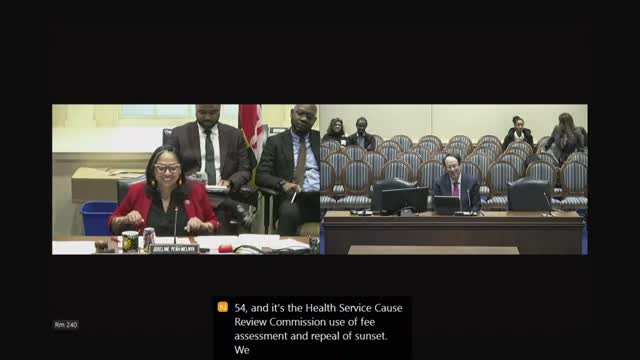HSCRC urges removal of sunset on user‑fee assessment to sustain analytics, regulatory work
Get AI-powered insights, summaries, and transcripts
Subscribe
Summary
Health Services Cost Review Commission officials told the House Health and Government Operations Committee that House Bill 54 would remove the sunset on the HSCRC’s user‑fee funding mechanism (capped at 0.1% of prior year hospital revenue) to preserve staffing, contracts and analytics tied to Maryland’s Total Cost of Care and AHEAD models.
The Health Services Cost Review Commission (HSCRC) told the House Health and Government Operations Committee that House Bill 54 would remove the sunset on the commission’s user‑fee funding mechanism and is necessary to preserve the agency’s analytic and regulatory capacity.
John Kromm, executive director of the HSCRC, said the commission is funded entirely through a user fee assessment capped at 0.1% of the prior fiscal year’s regulated hospital revenue and that House Bill 54 would remove the statute’s termination date rather than change the percentage. “What house bill 54 does is just removes the sunset on this funding formula,” Kromm said, describing the funding as essential to ongoing regulatory work and newly assigned analytic responsibilities under Maryland’s Total Cost of Care model.
Kromm told the committee the HSCRC’s work now extends beyond historical hospital rate regulation to include analytic and programmatic support for affordability, quality and population‑health programs — including the maternal and child health fund discussed earlier — and new responsibilities anticipated under the federal AHEAD model. He said the commission’s functions require multi‑year contracts and data infrastructure and that letting the funding formula lapse would cap the commission’s operating budget at $20 million in fiscal 2026, below current levels.
Nut graf: HSCRC officials said predictability in funding is required to retain staff, manage contracts and maintain data infrastructure needed for complex analyses of access, physician costs, medical debt, trauma funding and facility fees — tasks they said cannot be executed effectively within a repeatedly expiring funding mechanism.
Committee members asked whether removing the sunset would reduce accountability and whether a shorter extension might be preferable. Kromm said the work described is largely independent of the AHEAD model and would continue beyond a two‑year window; he argued multi‑year planning and contracting are needed to build durable analytic systems. He also said the commission reduces assessments when less funding is needed and remains subject to state budget and procurement oversight.
Delegates raised concerns reported in a letter from the hospital industry about predictability and urged ongoing dialogue. Kromm said the letter was new to the commission and that HSCRC typically engages daily with hospitals on policy outputs; he described monthly and annual reporting practices for budget and performance metrics.
In response to questions on whether the commission’s work saves money long term, Kromm pointed to HSCRC analyses that aim to identify drivers of total cost‑of‑care growth and said that improved visibility into unregulated costs such as physician payments can inform policies to constrain future cost growth while protecting outcomes.
Ending: Kromm urged a favorable report and committee members engaged in extended questioning about the commission’s role in upcoming budget adjustments and the AHEAD model’s implications for hospital finances. The hearing closed without a recorded vote.
